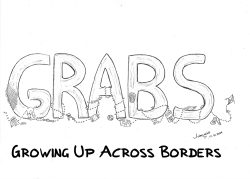By Glenda and Jane
“One of my clients is 9 months and one week pregnant. She was turned away from her local hospital. I’ve been worried all weekend about her and her baby”
These are the words of a social worker at Refugee Social Services, a GRABS partner, and one of the only organisations providing support to asylum seekers, refugees and other marginalised populations in eThekwini (Durban), South Africa. They reflect a wider crisis facing forced migrants across the country as their access to healthcare services is currently being blocked by organised protesters who refuse to let anyone without South African citizenship enter healthcare facilities. The blockaders are organised in a movement called March and March, linked to the xenophobic Operation Dudula which has previously organised raids on businesses to chase out foreign nationals from other African countries. Groups of these xenophobic protesters are now standing in front of hospitals and clinics to deny entrance to anyone who does not have South African citizenship. There have been violent clashes when non South Africans have tried to cross blockades to enter hospitals.
Other staff at RSS reported on children with autism who are being denied their regular medication, for example. And some of the young people who we spoke to in our research also expressed the way that this issue has become a major concern for them and their families. One young man talked about his mother who has glaucoma and has been turned away from a hospital when she went for treatment.
This situation is affecting all forced migrants, regardless of their status. Even those with asylum permits, refugee status or permanent residence are being denied access. As one young mother told us :
“We are not getting access to hospital even if we are documented”
And another young woman explained: “As soon as they see our names they block us”.
Blocking access to health care is against the South African Constitution. Section 27(1) of the Constitution of the Republic of South Africa, 1996, clearly provides that “everyone has the right to have access to healthcare services”. And a recent government statement affirmed that “Denying individuals healthcare based on their origin is a violation of our laws and values as a nation”.
However, little is being done to prevent the blockages and to enable people to realise their right to health care. The police have not so far acted to remove the blockades from in front of the hospitals.
This denial of rights should not be seen as a standalone issue, but as part of a wider problem. In fact, forced migrants have been gradually excluded from their rights over a period of many years. Previous research has pointed to the ways in which xenophobia/afrophobia amongst health care staff has led to barriers to access for migrants. And our own previous researchhas highlighted the way that this impacts migrant women who experience gender-based violence, and who are denied access to the support and protection they need in South Africa.
Young people we spoke to in our current research explained that they are also being systematically excluded from education and employment because of their migrant origins. This is true even of those who were born in South Africa.
The current health care crisis can thus be seen as a logical progression in exclusion due to increasing xenophobia/afrophobia, but also State failures. In fact, the timing of the current crisis is not surprising. The huge recent cuts in foreign development aid, and particularly US funding, have led to dramatic shortages of many drugs, such as anti-retroviral medication. These cuts have only exacerbated pre-existing failures in the South African healthcare system. Faced with such failures, it is easier to divert the blame onto migrants who are supposedly “taking away” medicine and health care from South Africans, than to face these shortcomings and to do something to address them.
As well as being a denial of basic rights, this blocking of migrants’s access to healthcare is also shortsighted, in that it will create situations where infectious diseases for example are left untreated, and thus spread more widely amongst the populations. Also those denied care for treatable conditions will experience increasingly poor health, and treating them once their condition becomes critical is more expensive than engaging in preventive medicine at an earlier stage.
As Yasmin Rajah, Director of RSS explains, the problems faced by migrants and by marginalised and excluded South Africans are in fact very similar or the same. However, it sometimes seems easier for politicians to pit these two groups against each other, than to find real long-lasting solutions to the problems.

